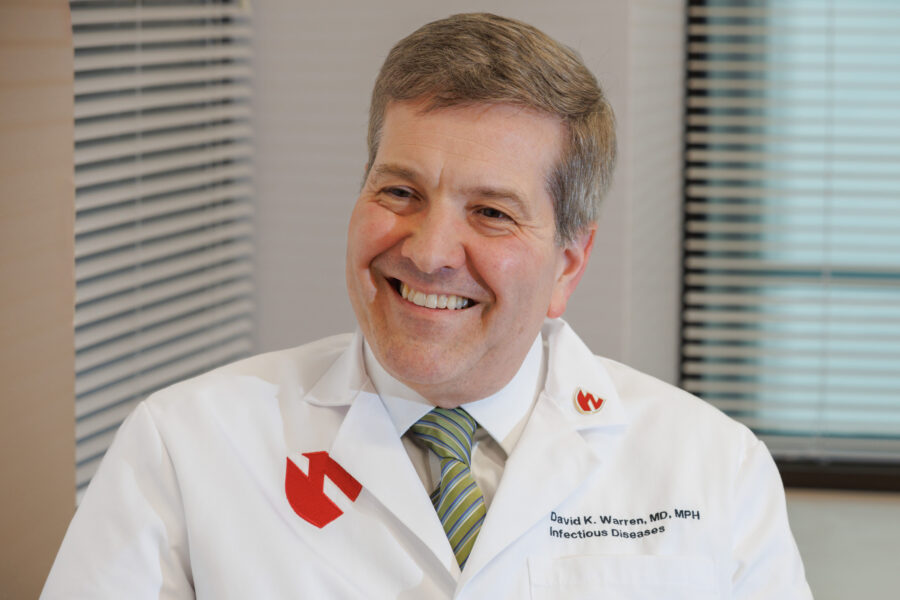David K. Warren, MD, originally didn’t want to be in health care.
His mother was a nurse; his father, a pharmacist. As a child and teen, conversations around the Warren dinner table had “a health-care bent,” he recalled with a smile.
He was interested in science, though, and when he arrived at Penn State University as a freshman, he majored in molecular biology, planning to get a PhD. But when he nabbed a prestigious summer internship at the National Institutes of Health, the young would-be scientist realized something – he didn’t like lab work that much.
What he did enjoy was occasionally joining his mentor, a pediatrician doing an NIH fellowship, who would moonlight at the nearby children’s hospital during his off hours.
“As a pediatrician, he would get called to deliveries if there was an issue,” Dr. Warren remembered. “And one of the nights I was with him, he got called to a delivery where the infant was in distress. So I got to see him help stabilize the infant. To me, that was a powerful moment, and it made me think ‘This looks like something I want to do the rest of my life.’”
Today, Dr. Warren is chief of the UNMC Division of Infectious Diseases, joining UNMC in January from Washington University School of Medicine in St. Louis.
Once in medical school, he said, infectious diseases seemed like the obvious option.
“I took a course in medical microbiology as an undergraduate and really enjoyed it. In medical school, I thought about doing obstetrics/gynecology. In residency, I thought about pulmonary medicine vs. infectious diseases.
“But I realized what I liked in pulmonary medicine was all the infectious disease issues that the pulmonologists deal with,” he said with a laugh. “I also had great mentorship in infectious diseases in medical school and residency.”
Since arriving at UNMC, he has been impressed by the division’s national and international impact.
“There’s a lot of work, internationally and nationally, that the infectious disease division and its faculty do to help support the university’s scientific mission,” Dr. Warren said. “But also, there is a commitment to support the clinical care of the people of Nebraska.”
Dr. Warren, who holds a Master of Public Health, said he was excited to find how closely the division is tied into public health efforts, both within the university’s college of public health and in collaboration with the state of Nebraska.
“That really benefits the people here,” he said.
And helping people, he said, is a core reason why people go into medicine in the first place.
“You do want to make a difference,” he said. “Whether it’s a personal difference in individual patients’ lives or their families, or a larger difference in training the next generation of physicians or making a research breakthrough, you are advancing the field and improving our ability to take care of people.”
Dr. Warren said he also enjoys the educational aspect of his role.
“Working with people who are early in their careers, trying to help them articulate what they want to do and help them find their way and be successful, is a joy. Also, teaching is learning. Being someone who is always curious is the sign of a good teacher. Students and trainees always keep you on your toes, and they make you examine things that you may otherwise take for granted, delve deeper into things.
“Listening to people is important on a clinical level, too. Infectious disease is a cognitive specialty; we put together a full picture after talking to the patient, studying the records, looking at all the studies and then coming up with a solution to explain what’s happening.”
Dr. Warren’s goals include building on the groundbreaking research that already is occurring in the division; increasing the infrastructure within the division; and establishing new connections and strengthening existing connections with the rest of UNMC, Nebraska Medicine and communities beyond.
